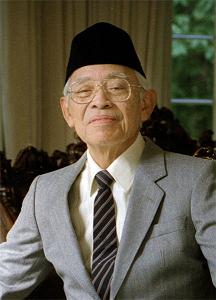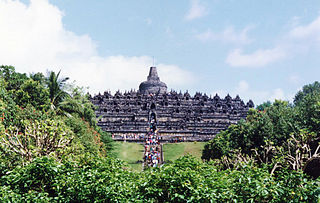Subud, acronym of Susila Budhi Dharma, is an international, interfaith spiritual movement that began in Indonesia in the 1920s, founded by Muhammad Subuh Sumohadiwidjojo (1901–1987). The basis of Subud is a spiritual exercise called the latihan kejiwaan, which Muhammad Subuh said represents guidance from "the Power of God" or "the Great Life Force."
John Godolphin Bennett was a British scientist, technologist, industrial research director, and author. He is best known for his books on psychology and spirituality, particularly on the teachings of G. I. Gurdjieff. Bennett met Gurdjieff in Istanbul in October 1920 and later helped to co-ordinate the work of Gurdjieff in England after the guru had moved to Paris. He also was active in starting the British section of the Subud movement, and co-founded its British headquarters.

Muhammad Subuh Sumohadiwidjojo was an Indonesian who founded the movement known as Subud. As a young man Muhammad Subuh claims to have received a series of intense experiences that he believed gave him contact with a spiritual energy from a higher power. By the 1930s, he believed that it was his task to transmit this energy - which he called latihan kejiwaan - to others, but that he was not to seek people out but simply to wait for those who asked for it.
Susila Dharma International Association (SDIA) is a non-profit association that aims to relieve human suffering and promote just and sustainable development. With activities in 29 countries, SDIA has 21 voting and 41 associate members. It works by:
The World Subud Association (WSA) is a non-profit association registered in the state of Virginia, United States. Its members are the national Subud associations of around 80 countries worldwide.

Sister Cities International (SCI) is a nonprofit citizen diplomacy network that creates and strengthens partnerships between communities in the United States and those in other countries, particularly through the establishment of "sister cities". A total of 1,800 cities, states, and counties are partnered in 138 countries around the world. The organization "strives to build global cooperation at the municipal level, promote cultural understanding and stimulate economic development".

The National Palace of Culture, located in Sofia, the capital of Bulgaria, is the largest, multifunctional conference and exhibition centre in south-eastern Europe. It was opened in 1981 in celebration of Bulgaria's 1300th anniversary.

Kejawèn or Javanism, also called Kebatinan, Agama Jawa, and Kepercayaan, is a Javanese religious tradition, consisting of an amalgam of animistic, Buddhist, and Hindu aspects. It is rooted in Javanese history and religiosity, syncretizing aspects of different religions.

The Korea Foundation is a non-profit public diplomacy organization established in 1991 to promote a better understanding of Korea and strengthen friendships in the international community. The Foundation carries out various projects for exchange between the South Korea and foreign countries to cultivate mutual understanding.

Susila Budhi Dharma is a book written by Muhammad Subuh Sumohadiwidjojo, the founder of the World Subud Association, in the city of Jogjakarta, Indonesia, in 1952. Its name corresponds to the three main qualities that are to be developed through the training in the Subud path. The name "Subud" is a contraction of these three Javanese words of Sanskrit derivation.
The Intra Asia Network, or IAN, is a loose consortium of cultural workers and creative spaces, artist exchange projects, community engagement initiatives and artist residency programmes operating throughout Asia. This consortium was founded to facilitate the greater mobility of Asia's cultural producers, practitioners, and creative people through the development, promotion and empowerment of artist-in-residency and artist-in-community projects. Membership represents over 15 countries and hundreds of Asian art spaces and initiatives.

Cultural policy is the government actions, laws and programs that regulate, protect, encourage and financially support activities related to the arts and creative sectors, such as painting, sculpture, music, dance, literature, and filmmaking, among others and culture, which may involve activities related to language, heritage and diversity. The idea of cultural policy was developed at UNESCO in the 1960s. Generally, this involves governments setting in place processes, legal classifications, regulations, legislation and institutions which promote and facilitate cultural diversity and creative expressions in a range of art forms and creative activities. Cultural policies vary from one country to another, but generally they aim to improve the accessibility of arts and creative activities to citizens and promote the artistic, musical, ethnic, sociolinguistic, literary and other expressions of all people in a country. In some countries, especially since the 1970s, there is an emphasis on supporting the culture of Indigenous peoples and marginalized communities and ensuring that cultural industries are representative of a country's diverse cultural heritage and ethnic and linguistic demographics.
William King Museum of Art, located in Abingdon, Virginia, serves the Tri-Cities/Abingdon/Bristol, Tennessee and Virginia areas. Located in an historic 1913 building that is a fully renovated former school, the William King Museum of Art features galleries showcasing art of the region and of the world, both contemporary and historic. The museum also features resident artist studios, an outdoor sculpture garden and the VanGogh Educational Outreach Program.
The creative city is a concept developed by Australian David Yencken in 1988 and has since become a global movement reflecting a new planning paradigm for cities. It was first described in his article 'The Creative City', published in the literary journal Meanjin. In this article Yencken argues that while cities must be efficient and fair, a creative city must also be one that is committed to fostering creativity among its citizens and to providing emotionally satisfying places and experiences for them.
The Center for Traditional Music and Dance (CTMD) is a leading folk/traditional arts organization based in New York City. Originally established as the Balkan Arts Center in 1968, CTMD assists the city's ethnic and immigrant communities in maintaining their traditions and cultural heritage. CTMD has developed a range of programs that emphasize research, documentation, collaboration, presentation, and education to help advance its mission of cultural equity. Over the past four decades, CTMD’s programs have led to the creation of nationally renowned ensembles, folk arts festivals, and community-based cultural organizations. CTMD provides the public with a full calendar of events designed to showcase and promote the diversity of New York City's performing arts traditions.
The United States Society for Education through Art (USSEA) is an American national association whose members work in curriculum development, teaching and research related to art education and cultural differences, and who share interests in art educational content and strategies which promote tolerance and appreciation of the arts of non-mainstream cultural peoples. The mission of the society is to promote greater understanding and respect for learners from all ethnic, minority, and socio-cultural backgrounds through research, art curricula, instruction, and practices that are inclusive and culturally sensitive.

The Forum of Culture and Arts of Uzbekistan Foundation, established in February 2004, was an NGO in Uzbekistan, pursuing the goal of supporting domestic science, culture, education and sports. Among the founders and trustees of the Fund are famous figures of culture and arts from Uzbekistan and foreign countries. Chairperson of Board of Trustees is Gulnara Karimova. The Fund Forum is already the biggest public organisation in Uzbekistan, and it is also rapidly expanding its international activities, currently it has representative offices in Moscow, Beijing, Tokyo, Paris, Vienna, Geneva, Madrid, New York City, Berlin and London. The NGO was closed in November 2013.

Kadist is an interdisciplinary contemporary arts organization with an international contemporary art collection. In addition to being a collecting body, Kadist hosts artists residencies and produces exhibitions, publications, and public events. The first location was opened in Paris in 2006 by Vincent Worms and Sandra Terdjman, and a San Francisco, California location was added in 2011 in the Mission District.
The Mississippi Arts Commission is an independent agency of the Mississippi state government and serves as the state's official grants-making and arts service agency. The Mississippi Arts Commission provides grant funding to both individual artists and organizations across the state. The agency was established by the Mississippi Legislature in 1968. The founding director, who was appointed by Governor John Bell Williams, was Lida Rogers. The current executive director is Malcolm White.

The Ukrainian Institute is a public institution of Ukraine that represents Ukrainian culture in the world and forms a positive image of Ukraine abroad. The institute was founded by the Cabinet of Ministers of Ukraine in 2017 and is affiliated with the Ministry of Foreign Affairs of Ukraine. It fully began its activities in the summer of 2018, after the appointment to the position of General Director Volodymyr Sheiko, as a result of an open competition and the creation of a team of specialists.